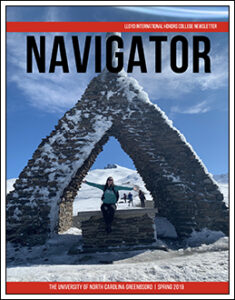 Navigator is the official newsletter of Lloyd International Honors College.
Navigator is the official newsletter of Lloyd International Honors College.
SPECIAL ISSUE
By Larson Matuck
The very first thing that students are told upon joining Lloyd International College at UNC Greensboro is Ludite, Explorate, Perficite!, translating into ‘Play, Experiment, Perform!’ And while the students are encouraged to live by this motto, so are the faculty that educate them. The Honors College is proud to have faculty that not only live by this motto, but exemplify it in their teaching. The faculty of the Honors College are experts in breaking traditional classroom norms, to help students not only retain information more effectively, but also to simply enjoy the learning process. The ability to learn is a wonderful thing, and the faculty of the Honors college respect this process, all the while making it fun and exciting. These faculty members encourage students to build a sense of agency, independence, and community, but above all, curiosity. Below are a handful of Honors faculty members from across the humanities and sciences who are happy to share their experiences inside and outside of the classroom, and how they make learning fun and effective!
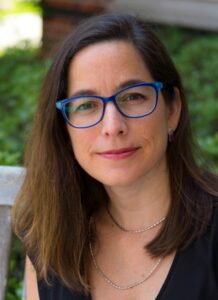 Dr. Cabello-Hutt is an Honors faculty member who teaches in the Department of Languages, Literatures, and Cultures at UNCG. Her educational focus is on gender, women, and Latin American culture. Dr. Cabello-Hutt had known for a long time that she wanted to pursue a career in feminist studies, however a catalyst for her career path was when she realized in graduate school that the readings and teachings were all focused on Western women. Realizing that this was a disservice to not only her education, but to the stories of other women throughout history, she decided to propose to her professors for a new class to solve this issue. Working with students around the world, Dr. Cabello-Hutt and her advisor created a new course entirely focused on untranslated feminist works, with students translating these texts in their native language and then educating each other about what they learned. This moment of agency influenced Dr. Cabello-Hutt both as a student and then as a professor, confirming her drive to support those around her to never be afraid of bringing their own knowledge and experiences to a discussion.
Dr. Cabello-Hutt is an Honors faculty member who teaches in the Department of Languages, Literatures, and Cultures at UNCG. Her educational focus is on gender, women, and Latin American culture. Dr. Cabello-Hutt had known for a long time that she wanted to pursue a career in feminist studies, however a catalyst for her career path was when she realized in graduate school that the readings and teachings were all focused on Western women. Realizing that this was a disservice to not only her education, but to the stories of other women throughout history, she decided to propose to her professors for a new class to solve this issue. Working with students around the world, Dr. Cabello-Hutt and her advisor created a new course entirely focused on untranslated feminist works, with students translating these texts in their native language and then educating each other about what they learned. This moment of agency influenced Dr. Cabello-Hutt both as a student and then as a professor, confirming her drive to support those around her to never be afraid of bringing their own knowledge and experiences to a discussion.
The experience of a small group working towards something greater tremendously influenced Dr. Cabello-Hutt’s future instructional strategy. Throughout her teachings, she has found a tremendous amount of value in small class sizes and the opportunities they bring. Smaller classes open up the door for more interconnected kinds of support and the building of networks within the class. By giving students the chance to connect in small class settings, they begin to feel more comfortable with each other and become willing to speak their minds about a given topic. This creates a space that cultivates more organic, free flowing discussions all the while staying focused on the source material. She encourages students to make their education their own and to always listen to their gut and intuition. She further encourages them to never be afraid to make whatever they are learning about personal, as that passion will drive them to continue to learn evermore.
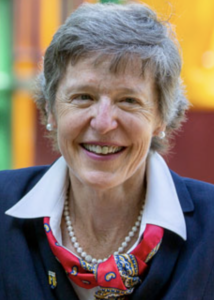 Prof. Eloise Hassel is an esteemed Honors faculty member who teaches in the Bryan School of Business, specializing in business law. Since Business Law is a course everyone in the school must take for their degree, she has taken it upon herself to make sure that every student is more than prepared for the world beyond college. Through her tedious efforts of outreach and research, Hassel has assisted students in finding opportunities for life after school through numerous databases for internships, government jobs, and career websites. And while you can see evidence of her work for students in multiple webpages worth of resources and guidance, she also works to stay physically present for students as well, always willing to offer advice and guidance where she can.
Prof. Eloise Hassel is an esteemed Honors faculty member who teaches in the Bryan School of Business, specializing in business law. Since Business Law is a course everyone in the school must take for their degree, she has taken it upon herself to make sure that every student is more than prepared for the world beyond college. Through her tedious efforts of outreach and research, Hassel has assisted students in finding opportunities for life after school through numerous databases for internships, government jobs, and career websites. And while you can see evidence of her work for students in multiple webpages worth of resources and guidance, she also works to stay physically present for students as well, always willing to offer advice and guidance where she can.
After her experience as an attorney and public defender, as well as multiple forays into the world of theater, Hassel shares that some of the best things in life come from being able to manifest it into reality. Hassel is a firm believer in the utility of reshaping the world around us to achieve our goals. This can be seen in the activities that she has her students partake in as part of their education. She firmly believes that by seeing yourself in the position you want to be in, that it will become a reality. In other words, one has to imagine themselves doing the things they want to become. This ‘manifestation’ of one’s dreams is a major source of inspiration for Hassel’s instructional activities. Some of her classroom activities include a mandatory courtroom sit-in for students to see business law in action, while other activities such as scavenger hunts allow students to find enjoyment through the learning process by turning it from strictly absorbing information into a memorable activity. Hassel has adopted the Honors College focus on ‘play’ in learning and turned the dial up to 11. Her focus on experiences and guidance has made Hassel an icon at UNCG, and encourages students to never stop pursuing their goals and dreams.
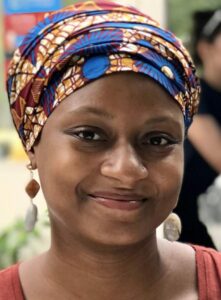 Between her time collecting data and publishing articles, Dr. Eyssallenne teaches an array of students at UNCG as an Honors faculty member in the African American and African Diaspora Studies Program. The content of her work focuses on themes within the global African Diaspora. Her past research has focused on ethnographic accounts in the field, and is currently working on a study abroad program focused on bringing students from India to UNCG. Throughout her work, one of the biggest parts of the process that brings her joy is reliving her experiences from her fieldwork. Ranging from witnessing private women’s rituals to organizing students to study abroad, she has carried a great many lessons from her field experience to the classroom.
Between her time collecting data and publishing articles, Dr. Eyssallenne teaches an array of students at UNCG as an Honors faculty member in the African American and African Diaspora Studies Program. The content of her work focuses on themes within the global African Diaspora. Her past research has focused on ethnographic accounts in the field, and is currently working on a study abroad program focused on bringing students from India to UNCG. Throughout her work, one of the biggest parts of the process that brings her joy is reliving her experiences from her fieldwork. Ranging from witnessing private women’s rituals to organizing students to study abroad, she has carried a great many lessons from her field experience to the classroom.
Crediting the many experiences she has had in the field, Dr. Eyssallenne works to give her students that same level of immersion in the classroom. She deploys an experiential learning teaching style. By creating experiences outside of the classroom she believes that one can learn more about a subject than only reading about it. This has led her to turning her lesson plans into events for students to experience and learn from, including field trips to historical sites or going to speaker events with people who have first-hand experience with particular topics. And not even an international pandemic stopped her efforts, as she has used Zoom to its fullest potential as an educational tool. For instance, she brought in speakers to class from across the country and the world to discuss their experiences and knowledge, further providing her students with an opportunity to “break through the page into the experience.”
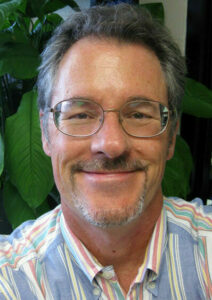 Dr. John Lepri is a longtime Honors faculty member who teaches Biology at all levels at UNCG, and while he has researched a multitude of systems such as plastic consumption and applications of a bodily rhythm, he takes these and focuses their effects on mammalian reproductive systems. Dr. Lepri has found multiple creative ways to engage with students both inside and outside of the classroom, ranging from interactive diagrams to testing students on their CNA skills before their final certifications exam. To Dr. Lepri, education is more than learning terms and definitions, it is about taking skills and applying them to real life.
Dr. John Lepri is a longtime Honors faculty member who teaches Biology at all levels at UNCG, and while he has researched a multitude of systems such as plastic consumption and applications of a bodily rhythm, he takes these and focuses their effects on mammalian reproductive systems. Dr. Lepri has found multiple creative ways to engage with students both inside and outside of the classroom, ranging from interactive diagrams to testing students on their CNA skills before their final certifications exam. To Dr. Lepri, education is more than learning terms and definitions, it is about taking skills and applying them to real life.
He has had students embark on multiple creative ways to both engage with the world around them as well as their own selves. For some classes, he has students measure their own internal vitals measurements to get practice while in others he has students sketch and label specific biological systems, or maybe even have students embark on virtual safaris to judge the neck length of a specific giraffe compared to others. He believes that creative group-based activities allow students to not only better absorb content, but also benefit from vocalizing these concepts, gaining confidence in public speaking as well as showcasing their knowledge. Going through the motion of recreating various biological systems through voice and drawing allows for a stronger retention of material. Dr. Lepri bridges the gaps in knowledge between himself and his students by allowing for a seamless exchange of ideas. By doing so, he encourages mutual understanding between himself and his students, as well as encourages students to more fully and confidently express themselves.
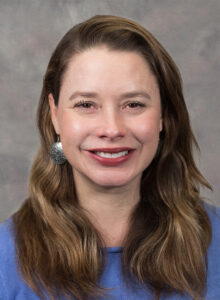 Dr. Marcia Hale is an Honors faculty member in the Department Peace and Conflict Studies, and her past research heavily focused on Water Systems and Resource conflicts. As an educator, Dr. Hale has come to find herself using a variety of different strategies and lenses to help educate her students on issues plaguing the world, but specifically through the viewpoint of environmental justice. While her past research on transboundary-water systems helps guide her education plan, she focuses on using the process of unlearning and the restructuring of cognitive systems to allow students to see the world through a different lens, humanizing the experience. Through her use of lenses in teaching, she uses an empathy-oriented approach to the learning experience that not only has her students think more deeply about issues plaguing environmental justice, but also allows for a more personal, creative experience.
Dr. Marcia Hale is an Honors faculty member in the Department Peace and Conflict Studies, and her past research heavily focused on Water Systems and Resource conflicts. As an educator, Dr. Hale has come to find herself using a variety of different strategies and lenses to help educate her students on issues plaguing the world, but specifically through the viewpoint of environmental justice. While her past research on transboundary-water systems helps guide her education plan, she focuses on using the process of unlearning and the restructuring of cognitive systems to allow students to see the world through a different lens, humanizing the experience. Through her use of lenses in teaching, she uses an empathy-oriented approach to the learning experience that not only has her students think more deeply about issues plaguing environmental justice, but also allows for a more personal, creative experience.
One of the biggest sources of joy that Dr. Hale has from being an educator is having students not only engaged, but fully immersed in the subject matter. This creates both a mutual excitement between educator and student both as explorers, as well as satisfaction in presenting material in an engaging way. Dr. Hale believes that the process of co-learning— learning both with and from students—allows each to more fully immerse themselves in the world and be able to reshape it. She sees herself as more of a guide than a teacher, by helping students find the entry points into a subject for them to dive into rather than having students simply absorb and regurgitate information. Not only does Dr. Hale guide education, she also personalizes it by having students ask themselves how they would handle conflicts, which then lets them better understand large-scale conflicts in the world, a process which she describes as “turning knowledge into wisdom.”
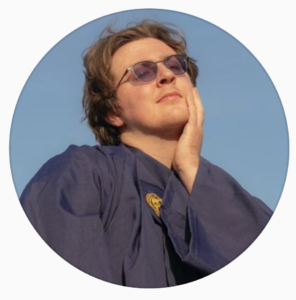
Larson Matuk is a graduate of Lloyd International Honors College at UNC Greensboro, where he received his B.A. in Political Science with a minor in Photography. He specializes in visual storytelling in documentary and fine art photography mediums.